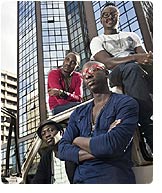|
|
 |
 Playback Killers and Epic Thinkers:
Playback Killers and Epic Thinkers:
Sauti Sol and the Bold AfroFuture Sounds of Nairobi at SXSW and on new EP with Electro-maverick Spoek Mathambo
“Africans are put in a box, always squeezed into one category,” exclaims Willis Chimano, sax player and vocalist in Sauti Sol, “but we refuse to stay there.”
The quartet can rock resounding guitars, blast the horns, croon in the sweetest harmony, and bring the Afrofunk with wry defiance and pop-friendly zeal. They can do a marathon studio session with eclectic indie darling South African producer/musician Spoek Mathambo and keep up with Ladysmith Black Mambazo at sold-out stadium shows. Their perfect balance of roots and pop have put Kenyan music on the African map, and their penchant for epic, ear-seducing songs has landed them at the top of the Kenyan music scene and promises to make a splash at this year’s SXSW.
As inspired by Coldplay and Queen as by African music legends, Sauti Sol burst with a confidence and energy on stage, forged over years of friendship and pushing for live performances. The four, some say, killed playback and breathed new life into the Nairobi scene.
“In Nairobi, we have the usual lip-synching artists, the people who put in a CD and sing on top of the music. That’s what’s given hype mostly,” explains singer Bien-Aime Baraza. “Then we also have a growing band culture. It’s coming up, and we’re credited with revamping the live scene in Nairobi. We’re honored to be thought of as pioneers.”
{full story below}
It all started out innocently enough: Three high school friends--Baraza, Chimano, and Delvin Mudigi—sang gospel together, but snuck in comparatively risqué boy-band tunes when no one was listening. “The church was one of the few outlets if you were interested in music,” Bien Aime notes. “Playing music in clubs and bars is still thought of as something for hooligans here. So we sang in the choir and sang gospel songs together.”
“When we felt particularly sinful, we sang Boyz II Men,” laughs Chimano.
During a Christmas play at the Alliance Française in Nairobi, an arts hub for the city and a springboard for the band, they ran into Polycarp Otieno, hanging around the front steps with his guitar. They hit it off, and the guys would gather in a downtown Nairobi park for rehearsals. While trying their luck at a singing competition, they ran into John Katana, a reggae-pop legend in Kenya, who took them under his wing. Thanks to Katana, the group changed courses dramatically from an a cappella boy band to an Afro-fusion power quartet.
“Mr. Katana told us we need to have our own sound and that that can only come from our roots and from our mother tongues like Swahili,” Baraza reflects. “To give it a good African feel. It really worked for Kenya; that’s how we became successful here.”
That African feel shines through on hopeful, polyrhythmic tracks like “Mbinguni,” where rolling percussion, shimmering guitar lines, and soaring R&B vocals meet. A bluesy, gritty ballad shifts into perfectly entwined, bittersweet harmonies on “Awinja.” Reggae vibes, African style (“Private Spice”) flow into wide-ranging, complex acoustic arrangements with strings, choruses of aching voices, and tender percussive touches (“Row Your Boat,” “Bowana Lelisu”).
As nimble lyrically as musically, the band knows how to get a message across, how to talk about the everyday plight of young people in a meaningful way. “It’s boring just to sing about love and sex and all that,” muses Otieno. “We try to get at issues that matter here, like education, which is a big deal.” “Soma Kijana” resonated with young Kenyans (especially when the band donned goofy school uniforms to make a humorous point in a popular video). “Sol Generation” speaks to the new young generation who refuse to repeat the political and cultural mistakes of their fathers.
“It’s about a new generation of epic thinkers, people who have evolved mentally,” says Bien Aime. “It’s about people who are chosen to think differently in society.”
This evolution is part of Sauti Sol’s growing appeal. The group spearheads the burgeoning live music scene in once lip-sync-dominated Nairobi. While the band regularly shares the stage with revered African icons like Salif Keita and Ladysmith—tens of thousands of ecstatic fans flew into a joyful frenzy at their last show together—they, like many young, savvy artists from across the continent, are insisting on reframing the conversation on what African music and art is. That’s why the collaboration with Spoek Mathambo felt like a no-brainer for the group.
A Swedish fan in Berlin made Mathambo listen to the band’s albums. He was hooked and eventually came for a week to Nairobi. The group leaped into the studio with a set of new, light-hearted songs, as Mathambo arrived, tracks in hand. They worked feverishly and jumped nimbly from blues jams to rave-ready techno (“Rangerover”), from East African vintage vibes to serious addictive electro-funk (“Summer Love”), from disco-synth to dissonant and angular guitar vamps (“Disco Lover”).
Yet while relishing the envelope-pushing, button-crunching pleasures of studio play, Sauti Sol come into their own live. “It’s about the spirit, the sense of style,” Baraza exclaims. “It’s hard to put your finger on, but people feel it.” “We have this swagger that comes from where we come from. Sometimes it even baffles us,” Chimano laughs. “But we want people to know: In five years, we’ll be all over. No box can hold us now!”
|
|
 |
|
|
|